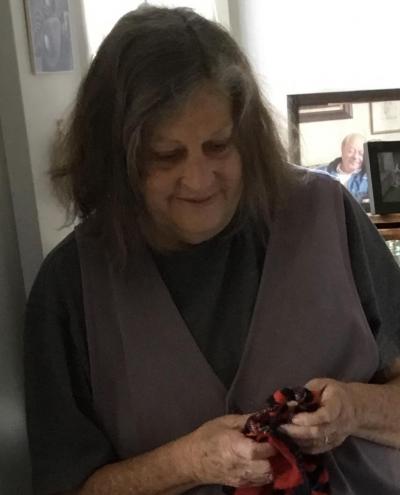Middleboro history is woven like a tapestry through her life
MIDDLEBORO – The tapestry of Mary Guidoboni’s life is woven like her rugs, circles of braids rich with color and warmth.
Although she’s well into her 80s, she is still teaching the uniquely American art of rug braiding. Her phone rings with calls from rug makers looking for instruction, help in lacing or troubleshooting why the rug doesn’t lay flat.
For Guidoboni, braiding rugs is a connection to Colonial times, and also to the future, because they’re virtually indestructible. “The only thing that will kill them are pets,” she says.
To make a braided rug, Gudiboni tightly braids three folded wool strips and then laces them together with a heavy thread. If the lacing is not done correctly the rug will bump up, and that can be a big problem, Guidoboni said. Her smaller round rugs typically take about five weeks to make and can cost upwards of $150.
When Guidoboni was a young woman gathering with other young women from Plympton and Middleboro for a weekly Mother’s Club, she learned to braid. “It was mothers sharing their skills,” she said.
Those days have passed, now she says, “I’m one of the old timers,” and she is passing the lost art to a new generation of rug makers.
The Guidoboni name is linked to the town’s great dairies, including the Wiksten Brothers, the Blanchard, Gates and Picone dairies, all of North Middleboro.
Middleboro’s once thriving milk community boasted more than 100 dairies. The now defunct Middleboro Gazette recorded a multitude of crashes involving milk trucks through the years.
By the late 1980s the Wiksten Brothers Dairy on Cedar Street shut down after one of the brothers broke his leg. Guidoboni and her husband sold their farm to the town, and Picone’s stopped milking. Today the last dairy left in Middleboro is Lolan Farms formerly Blanchard’s, on Thompson Street.
The Guidoboni farm dates to 1662 when George Soule bought land from the Wampanoag Indians. The original homestead was razed during King Philip’s War in the 1670s.
The present farmhouse was built by George Soule’s descendent Augustus Soule, whose daughter Irene married Albert Deane in the late 1800s and changed the name from the Soule Farm to the Deane Farm. Then Columbo Guidoboni entered the picture as a farm hand.
His family came from Italy with the wave of immigrants seeking work in the Middleboro’s industrial mills. Most of the Guidobonis worked in the shoe shops, but Columbo Guidoboni hated working indoors and quit his job at the George E. Keith Shoe Shop to work at the Deane’s dairy.
“Albert Deane left animals and equipment to my father-in-law,” Mary Guidoboni said. Deane’s wife, the former Irene Soule, left him the land. The dairy was renamed the Guidoboni Farm, where more than 100 cows grazed and the family pasteurized milk for wholesale.
Mary Guidoboni came to town in 1954 when she married Columbo’s son Donald and they rented the second floor in the iconic yellow farm house for $10 a month which included all the milk and eggs they could eat. It was a hop skip and a jump from her childhood home two-miles away in Plympton.
The farm holds great memories for the children of East Middleboro. Julie Leo (formerly Hegarty) recalls Guidoboni’ s cows grazing along Soule and onto Cedar Street.
“Sometimes the cows would escape. You’d look out the window and your backyard would be full of cows,” Leo said.
Haying is something of a neighborhood legend, with the older children helping out at the Guidoboni Farm or the Wiksten Brothers Dairy during haying season. Leo’s brother Michael, her late sister Erin, and other neighborhood children including the Ryans and Atwoods, worked for farmers at haying time.
Leo said at the end of the day the Wiksten Brothers only had milk or beer. “Of course the kids grabbed the beer.”
As a youngster Leo played Wiffle ball with “the aunties,” who were unmarried Guidoboni sisters living across from the farm. Leo said neighborhood kids from Soule and Cedar streets would get together for games with “Sarah, Clara and Liz.”
Those bygone days in the 1970s held Halloween parties in the Guidoboni barn that culminated with a hayride to a nearby graveyard. “Mr. Guidoboni would load us up on the tractor and drive us to a graveyard. Someone would be waiting in a white sheet and some kids always ended up crying,” Leo said. “It was wicked fun.”
Mary Guidoboni doesn’t romanticize life on the farm, she said it was hard work that included milking twice a day. Milking the herd took more than two hours. “It was a business, and I was afraid of the cows, they did kick.” Instead of working on the farm, she taught in the Plymouth public schools.
Her husband Donald Guidoboni ran the family farm on Soule Street until the 1980s, cutting up to 10,000 bales of hay a year, before selling it to the town for $1.2 million. Today the town leases the property to the Soule Homestead Education Center for just under $300 a month and an agreement that the buildings and property are maintained.
After the sale, Mary Guidoboni and her late husband moved to a townhouse along Plymouth’s waterfront. Her love of textiles is evident throughout her home: a European Tapestry hangs in the foyer; the floors are covered in braided rugs and swatches of unusual handwork are scattered throughout.
Guidoboni is usually making several rugs at the same time, moving from one to the next when a color runs out or she simply wants a change. Most of her wool strips are new, but she’s not above ripping down used coats, and has several old Navy and Army uniforms waiting to be turned into rugs. “If I want a color I take the clothing.”
Guidoboni demonstrates the art of braiding rugs at the Plymouth Antiquarian’s open houses and for several decades she’s held workshops at the Soule Homestead.
It’s important to preserve farmland and Guidoboni is pleased Town Meeting supported buying the Picone Farm this week. “It’s better than houses. It’s a big piece of land, that’s great,” she said.
Guidoboni’ s next workshop on rug braiding will be held at the Soule Homestead Education Center, on Oct. 15. Bring scissors, needles, thread and wool. Call (508) 947-6744 to register, or email info@soulehomestead.org.















